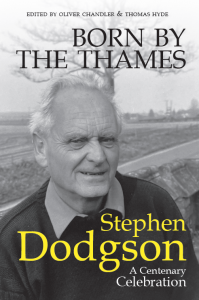Stephen Dodgson: a centenary celebration
ed. Oliver Chandler & Thomas Hyde
DE LA PORTE
ISBN 978-1-8383269-1-3
 A first-rate volume, carefully crafted to appeal to both the average music-lover and the professional seeking more detailed information, this immediately becomes the definitive handbook on its subject. Dodgson, a distant cousin to Lewis Carroll, was a prolific and highly accomplished composer whose lyrical and approachable output has not yet had its due. The nascent online work by the Trust that bears his name promises much.
A first-rate volume, carefully crafted to appeal to both the average music-lover and the professional seeking more detailed information, this immediately becomes the definitive handbook on its subject. Dodgson, a distant cousin to Lewis Carroll, was a prolific and highly accomplished composer whose lyrical and approachable output has not yet had its due. The nascent online work by the Trust that bears his name promises much.
He is placed finely in context through estimable biographical introductions from his widow, Jane Clark Dodgson, and Thomas Hyde. These are complemented by memories and tributes from eight eminent colleagues and friends, including guitarist Mark Eden and pianist John Lill. Deeper analysis begins with four chapters by Dodgson himself discussing his working methods and influences, including an amusing reminiscence of writing for the harpist Marisa Robles.
The kernel of the book is a mini-symposium devoted to various perspectives on his music by nine similarly distinguished writers. Pamela Nash, in an interview with Dodgson from 2001, discusses the influence of Scarlatti and other matters in Dodgson’s idiomatic writing for harpsichord: forty-nine works at the time, a record surely without parallel among twentieth-century composers.
His numerous assured and attractive works for guitar (he was not a player but understood the instrument thoroughly) are considered by Lance Bosman. Less commonly among composers of serious music, Dodgson also featured the instrument in an accompanying role for solo song. There are over one hundred vocal works, some of which are receiving wider dissemination on the Somm label, and Stuart O’Hara introduces them from a performer’s perspective. Before Judith Weir’s superb setting of Illuminare Jerusalem became ubiquitous, those with longer memories may recall Dodgson’s haunting mock-mediaeval setting for the King’s Singers (recorded on a 1973 Christmas LP but never reissued on CD).
David Wordsworth’s chapter on the choral music whets the appetite to explore the many recordings of Dodgson now available, and an encouragingly ample Discography is included. An intriguing chapter by Philip Cooke focuses on the largely unknown theatre works, notably the opera indebted to Britten’s Suffolk environs, Margaret Catchpole: Two Worlds Apart (which, thanks to the advocacy of Naxos in 2021, also need remain obscure no longer).
Like Elizabeth Maconchy and David Matthews, Dodgson was particularly drawn to the medium of the string quartet, producing nine in total, for which Joanna Bullivant provides an inviting but brief overview – which is only to say that even at almost 300 pages, the book is all too short.
The full list of compositions is impressively substantial compared with the abbreviated catalogue in Grove. As a result, I missed discussion of Dodgson’s sonatas (seven virtuosic examples for piano alone), other chamber music, and the larger orchestral works and concerti, such as his five Essays for orchestra, essentially symphonies in all but name. However, for a volume of this size and extremely modest price, there is an especially generous provision of colour plates – twelve pages on glossy paper, all excellently reproduced – together with other illustrations, photographs and music examples. This is an essential purchase and should win the composer many friends.
Andrew Plant
British Music Society





